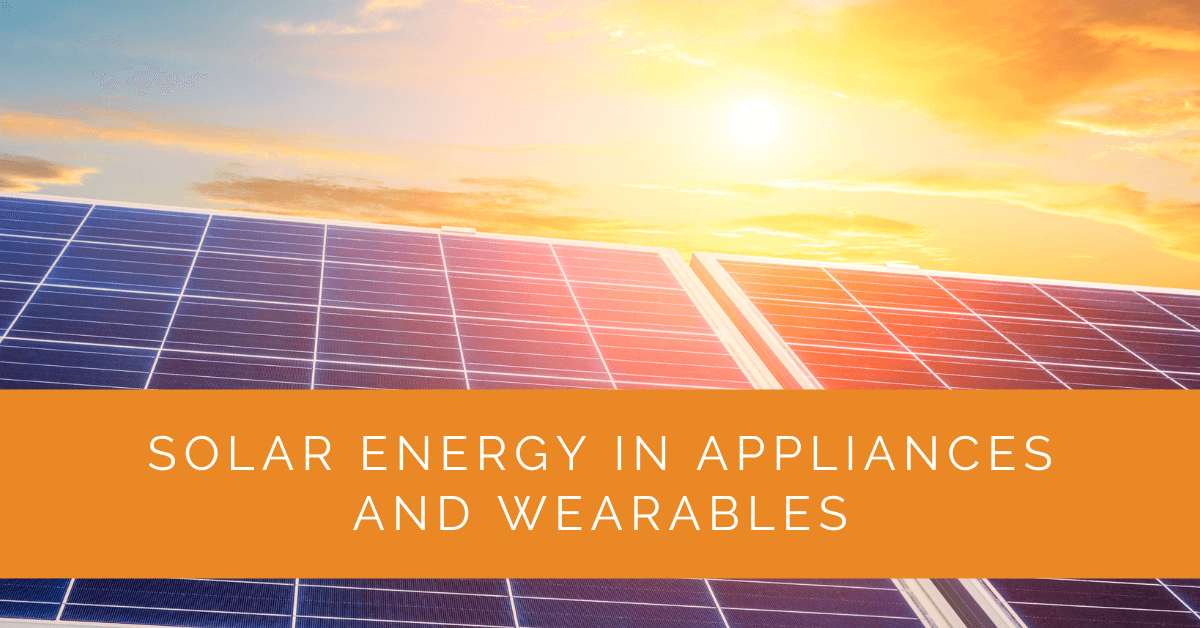Solar energy has emerged as a powerful alternative to traditional power sources in an era of increasing environmental consciousness and pursuing sustainable solutions. The ability to harness the sun’s energy opens up numerous possibilities in various sectors, including appliances and wearables. In this article, we will explore how solar energy is revolutionizing the world of appliances and wearables, providing efficient and eco-friendly power solutions.
Contents
- 1 Key Takeaways
- 2 Solar Energy: A Sustainable Power Source
- 3 Solar-Powered Appliances: Efficiency and Convenience
- 4 Wearable Solar Technology: Power on the Go
- 5 Portable Solar Devices: Energy on the Move
- 6 Advancements in Solar Technology for Appliances and Wearables
- 7 Expert Insights From Our Solar Panel Installers About Solar Energy in Appliances and Wearables
- 8 Experience Solar Excellence with Us!
- 9 Conclusion: Embracing Solar Energy in Everyday Life
- 10 FAQ
Key Takeaways
- Solar energy is revolutionizing the world of appliances and wearables, providing efficient and eco-friendly power solutions.
- Solar-powered appliances offer convenience, efficiency, and cost savings, with applications ranging from lighting to heating and cooling systems.
- Wearable solar technology and portable solar devices empower individuals to stay connected, power their electronic devices on the go, and embrace sustainable energy solutions.
Solar Energy: A Sustainable Power Source
Understanding Solar Energy
Solar energy is the radiant heat and light from the sun that can be harnessed and converted into usable electricity. It is a renewable energy source that offers numerous environmental benefits and does not rely on fossil fuels or other non-renewable resources.
Benefits of Solar Energy
The use of solar energy presents a wide range of benefits. Firstly, solar power is a clean and renewable energy source, meaning it does not produce harmful emissions or contribute to climate change. Additionally, solar energy can help reduce dependence on fossil fuels, decrease electricity costs, and contribute to a more sustainable future.
The Growing Role of Solar Energy in Various Sectors
Solar energy is making significant strides in various residential, commercial, and industrial sectors. Large-scale solar power plants and rooftop solar panel installations are becoming more prevalent, providing electricity to homes, businesses, and communities. The focus on solar energy in appliances and wearables is part of the broader trend toward incorporating sustainable practices and reducing reliance on non-renewable energy sources.
Solar-Powered Appliances: Efficiency and Convenience
Solar Lighting Solutions
Solar-powered lighting solutions have gained popularity due to their energy efficiency and versatility. From outdoor solar-powered lights to solar-powered lamps and indoor lighting systems, these appliances harness the sun’s energy during the day and store it in batteries for illumination at night. Solar lighting reduces electricity consumption, lowers utility bills, and extends lighting options to remote areas without access to the power grid.
Solar-Powered Home Appliances
In addition to lighting, various home appliances can be powered by solar energy. Solar water heaters utilize solar thermal energy to heat water, reducing the need for electricity or fuel. Solar-powered refrigerators, fans, and air conditioners are other appliances that can operate using solar power, providing sustainable and cost-effective alternatives.
Solar Heating and Cooling Systems
Solar heating and cooling systems offer efficient ways to control indoor temperatures using renewable energy. Solar thermal systems capture the sun’s heat and transfer it to water or air for heating. Similarly, solar-powered air conditioning systems use solar energy to drive the cooling process, reducing the reliance on conventional electricity and decreasing the environmental impact.
Solar-Powered Ventilation
Solar-powered ventilation systems provide a sustainable solution for maintaining fresh air circulation in buildings. These systems utilize solar energy to power fans or air vents, promoting air exchange and reducing the need for traditional electric-powered ventilation systems. Solar-powered ventilation is particularly beneficial in areas with limited electricity access or during power outages.

Wearable Solar Technology: Power on the Go
Exploring Wearable Solar Technology
Wearable solar technology combines fashion and functionality by integrating solar panels into wearable devices, such as watches, fitness trackers, and smart clothing. These solar-powered wearables generate electricity from the sun’s rays, providing a continuous power source for electronic devices.
Solar-Powered Wearables for Health and Fitness
Solar-powered wearables are revolutionizing the health and fitness industry. Fitness trackers and smartwatches with integrated solar panels can generate electricity to power their features, eliminating the need for frequent charging. This technology ensures uninterrupted monitoring of vital signs, activity tracking, and notifications, empowering individuals to stay connected and motivated.
Solar-Powered Wearables for Communication and Connectivity
Solar-powered wearables also contribute to improved communication and connectivity. Smart glasses, for example, can incorporate solar cells to power augmented reality (AR) displays and wireless communication features. Solar-powered wearable devices offer a sustainable solution for staying connected, even in remote locations or during outdoor activities.
Innovative Applications of Wearable Solar Technology
The potential applications of wearable solar technology extend beyond watches and fitness trackers. Researchers are exploring the integration of solar cells into clothing, enabling solar-powered charging for electronic devices, such as smartphones, tablets, and portable music players. This innovation holds promise for a future where wearable solar technology seamlessly integrates into everyday life.
Portable Solar Devices: Energy on the Move
Portable Solar Chargers
Portable solar chargers provide a convenient and eco-friendly way to recharge electronic devices. These compact devices utilize solar panels to capture sunlight, converting it into usable electricity to charge smartphones, tablets, cameras, and other portable devices. Portable solar chargers are especially useful during outdoor activities, travel, or emergencies when traditional power sources are not readily available.
Solar-Powered Camping and Outdoor Gear
Solar-powered camping gear has gained popularity among outdoor enthusiasts seeking sustainable and energy-efficient solutions. Portable solar panels can generate electricity for charging devices, powering LED camping lights, operating portable fans, or even running small appliances. Solar energy eliminates the need for carrying extra batteries or relying on traditional power sources while enjoying nature.
Solar-Powered Transportation Solutions
Solar energy is also finding its way into transportation. Solar-powered backpacks and bags are equipped with solar panels that can charge electronic devices while on the move. Solar-powered vehicles, such as solar bicycles or solar-powered electric scooters, utilize photovoltaic cells to generate electricity, reducing reliance on conventional fuel sources.
Sustainable Gadgets for Travelers
For travelers seeking sustainable alternatives, solar-powered gadgets offer a range of options. Portable solar-powered water purifiers allow access to clean drinking water by utilizing solar energy to filter and sterilize water from natural sources. Similarly, solar-powered flashlights and lanterns eliminate the need for disposable batteries, providing long-lasting and eco-friendly lighting solutions.

Advancements in Solar Technology for Appliances and Wearables
Photovoltaic Cells: The Heart of Solar Technology
Photovoltaic (PV) cells, commonly known as solar cells, are the core components of solar technology. These cells convert sunlight into electricity by harnessing the photovoltaic effect. Ongoing research and advancements in PV cell technology continue to improve efficiency, durability, and affordability, making solar energy more accessible for various applications.
Improving Efficiency and Performance of Solar Cells
Scientists and engineers are continually working on improving the efficiency and performance of solar cells. Innovations such as multi-junction solar cells, tandem cells, and perovskite solar cells aim to enhance energy conversion efficiency and enable greater power generation even under challenging lighting conditions. These advancements drive the adoption of solar energy in appliances and wearables.
Integration of Solar Power in Miniaturized Devices
The integration of solar power in miniaturized devices presents unique engineering challenges. Designing solar cells to fit the form factor of wearables or small appliances requires compact and lightweight solutions. Flexible and thin-film solar cells offer promising possibilities for seamlessly integrating solar power into compact devices without compromising aesthetics or functionality.
Future Prospects and Innovations in Solar-Powered Appliances and Wearables
The future of solar-powered appliances and wearables is promising, with ongoing research and technological advancements fueling innovation. Integrating energy storage systems, such as solar batteries, with appliances and wearables further enhances their usability and ensures a continuous power supply even when sunlight is limited. Additionally, using artificial intelligence (AI) and smart energy management systems can optimize energy usage and maximize the benefits of solar power.
Expert Insights From Our Solar Panel Installers About Solar Energy in Appliances and Wearables
Integrating solar energy into everyday appliances and wearables is a game-changer. It not only enhances sustainability but also offers practical benefits like extended battery life and reduced energy costs.
Lead Solar Technician
Wearable solar technology is revolutionizing personal electronics by providing continuous power supply through sunlight. This innovation is crucial for those who require constant connectivity without frequent recharging.
Senior Solar Consultant
Solar-powered appliances are paving the way for a more sustainable future. From solar water heaters to solar-powered refrigerators, these technologies significantly reduce energy consumption and promote environmental responsibility.
Commercial Solar Specialist
Experience Solar Excellence with Us!
Trust in Solar Panels Network USA, where our seasoned experts deliver top-quality solar solutions for homes and businesses nationwide. With a legacy of countless successful installations and a commitment to sustainable energy, we’re your reliable partner in the solar journey. Ready for a brighter, eco-friendly future? Call us now at (855) 427-0058 and harness the power of the sun!
Conclusion: Embracing Solar Energy in Everyday Life
Solar energy transforms how we power appliances and wearables, offering sustainable alternatives to conventional electricity sources. Solar-powered appliances and wearables provide numerous benefits, including reduced reliance on fossil fuels, cost savings, and environmental preservation. By embracing solar energy, we can harness the sun’s power and create a brighter, cleaner, and more sustainable future for all.
FAQ
What is wearable solar?
Wearable solar refers to integrating solar panels or photovoltaic cells into wearable devices, such as watches, fitness trackers, and clothing, to generate electricity from sunlight and power the device’s functionalities.
What is the battery life of wearable technology?
The battery life of wearable technology varies depending on the device’s power consumption, usage patterns, and battery capacity. Wearable solar devices often have longer battery life than their non-solar counterparts as they can continuously generate electricity from sunlight to supplement or replace battery power.
How does a wearable device work?
A wearable device typically consists of sensors, processors, a display, and a power source. In the case of wearable solar devices, they incorporate solar panels or photovoltaic cells to convert sunlight into electricity. This generated power operates the device’s functions and charges an internal battery for extended use.
What are solar-powered gadgets?
Solar-powered gadgets are electronic devices that utilize solar energy as their primary or supplementary power source. These gadgets often incorporate solar panels or photovoltaic cells to capture sunlight and convert it into usable electricity, reducing the need for traditional battery power and enabling sustainable, off-grid operation. Examples include solar-powered chargers, flashlights, and outdoor gear.
About the Author
Solar Panels Network USA stands at the forefront of solar energy solutions, driven by a team of seasoned solar engineers and energy consultants. With over decades of experience in delivering high-quality solar installations and maintenance, we are committed to promoting sustainable energy through customer-centric, tailored solutions. Our articles reflect this commitment, crafted collaboratively by experts to provide accurate, up-to-date insights into solar technology, ensuring our readers are well-informed and empowered in their solar energy decisions.

